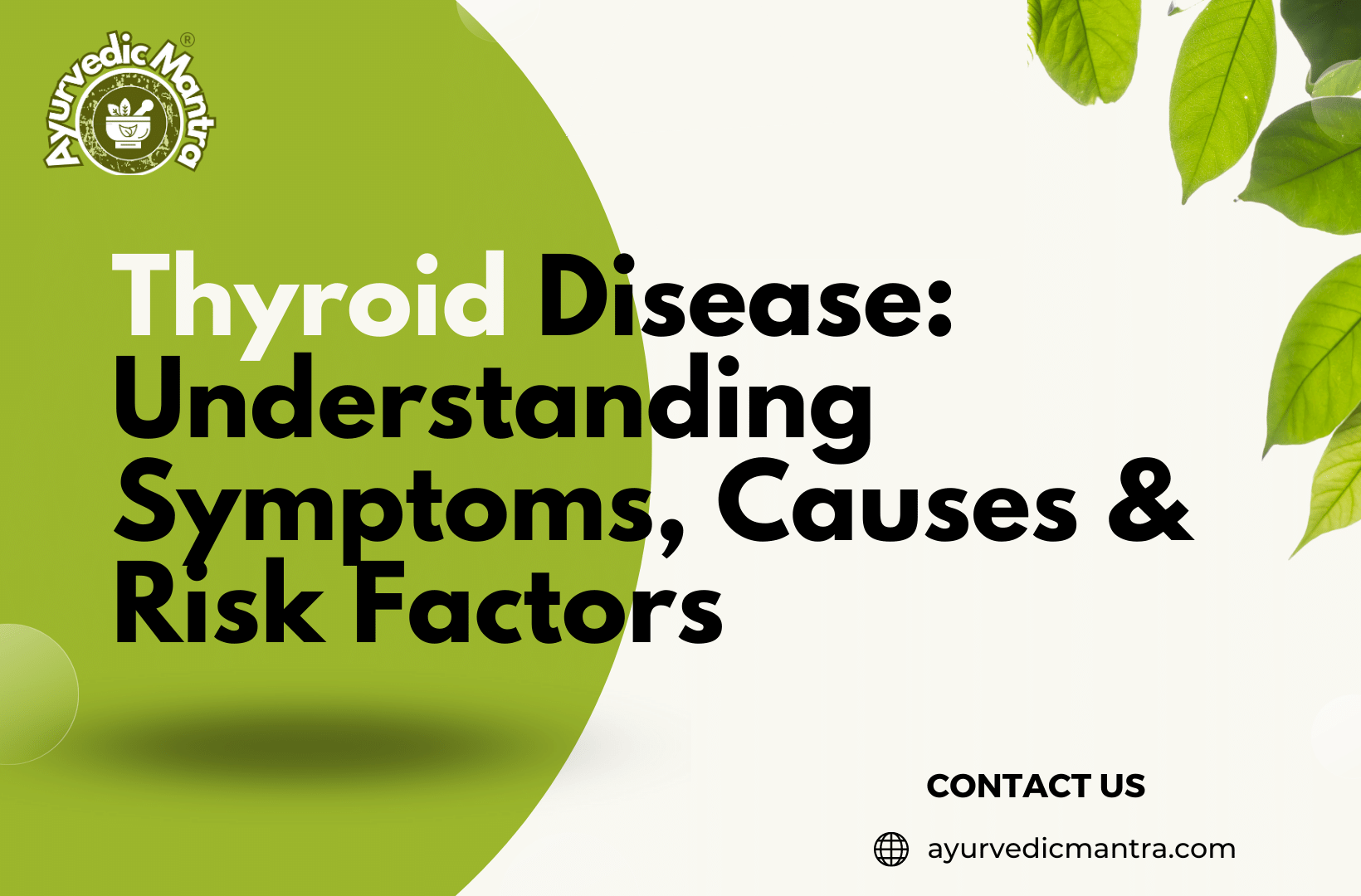
PCOD/PCOS: Ayurvedic Treatment is Best
Introduction Polycystic Ovary Disorder (PCOD) or Polycystic Ovary Syndrome (PCOS) is a common endocrine disorder affecting millions of women worldwide. It leads to hormonal imbalances,

In recent years, thyroid disease has become a prevalent health concern affecting millions worldwide. The thyroid gland plays a vital role in regulating various bodily functions, making it crucial to understand the symptoms, causes, and risk factors associated with thyroid disorders. This comprehensive article will delve into the world of thyroid disease, providing valuable insights to help you recognize and manage this condition effectively.
The thyroid gland is a small, butterfly-shaped gland in the front of the neck. Despite its size, it plays a significant role in maintaining overall health by producing hormones that regulate metabolism, energy levels, body temperature, and various organ functions.
There are several types of thyroid disorders, with the most common ones being:
Recognizing the symptoms of thyroid disease is crucial for early detection and proper management. Some common symptoms include:
Several factors contribute to the development of thyroid disorders. Some common causes include:
While thyroid disease can affect anyone, certain factors can increase the risk, including:
If you experience symptoms of thyroid disease, it’s essential to consult a healthcare professional. They may perform a physical examination, conduct blood tests to check thyroid hormone levels, and, if necessary, recommend imaging tests to evaluate the thyroid gland’s structure.
Treatment for thyroid disorders depends on the specific condition. Hypothyroidism is typically managed with synthetic thyroid hormone replacement, while hyperthyroidism may involve medications to reduce hormone production or radioactive iodine therapy. In some cases, surgery might be necessary to remove all or part of the thyroid gland.
Living with thyroid disease requires some lifestyle adjustments and regular medical check-ups. It’s crucial to adhere to prescribed medications and maintain a balanced diet rich in iodine and other essential nutrients. Regular exercise can also help regulate metabolism and improve overall well-being.
Thyroid disease can significantly impact a person’s quality of life, but it is manageable with early detection, proper diagnosis, and appropriate treatment. Understanding the symptoms, causes, and risk factors associated with thyroid disorders empowers individuals to take control of their health and seek timely medical intervention when needed. If you suspect you have thyroid issues or experience any concerning symptoms, don’t hesitate to consult a healthcare professional for evaluation and personalized care. Remember, knowledge is the key to maintaining a healthy thyroid and a healthier you.
Frequently Asked Questions (FAQs) about Thyroid Disease
The thyroid gland is a small, butterfly-shaped gland in the front of the neck. Its primary function is to produce hormones that regulate metabolism, energy levels, body temperature, and various organ functions.
The common types of thyroid disorders are:
Symptoms of thyroid disease include fatigue, weight changes, mood swings, irregular menstrual periods, hair and skin changes, muscle weakness, and temperature sensitivity.
Thyroid disorders can be caused by autoimmune diseases, iodine deficiency, thyroid nodules, thyroiditis, and genetic predisposition.
Some risk factors include being female, age (risk increases with age), family history of thyroid disease, radiation exposure, and hormonal changes during pregnancy.
Diagnosis involves a physical examination, blood tests to check thyroid hormone levels, and, if necessary, imaging tests to assess the thyroid gland’s structure.
Treatment depends on the specific condition. Hypothyroidism is typically managed with synthetic thyroid hormone replacement, while hyperthyroidism may involve medications to reduce hormone production or radioactive iodine therapy. Surgery might be necessary in some instances.
No, thyroid disease requires medical attention. Timely diagnosis and treatment are crucial to manage the condition effectively and prevent complications.
A family history of thyroid disease can increase an individual’s risk of developing similar conditions.
Living with thyroid disease involves:
Untreated thyroid disease can lead to various health complications, including cardiovascular problems, metabolic disorders, and issues with reproductive health.
While complementary approaches may help manage symptoms, they should not replace medical treatment. Always consult a healthcare professional before trying any alternative therapies.
Yes, prolonged stress can impact hormone levels and potentially contribute to thyroid imbalances.
While it may not be entirely preventable, maintaining a healthy lifestyle, including a balanced diet and regular exercise, can support overall thyroid health.
Yes, thyroid disorders can impact fertility and may cause complications during pregnancy. Proper management and monitoring are essential for pregnant women with thyroid disease.

Introduction Polycystic Ovary Disorder (PCOD) or Polycystic Ovary Syndrome (PCOS) is a common endocrine disorder affecting millions of women worldwide. It leads to hormonal imbalances,

Introduction Losing weight is a journey that requires dedication, consistency, and self-care. While there are numerous weight loss techniques out there, not all of them

Polycystic Ovary Syndrome (PCOS) is a hormonal disorder that affects millions of women worldwide. It can lead to various health complications, such as irregular periods,

In recent years, Ayurveda, an ancient system of natural healing originating from India, has gained significant popularity as an alternative approach to treating various health

आजकल वजन बढ़ने और चर्बी की वृद्धि होने की समस्या एक आम समस्या बन गई है। बढ़ते वजन और अतिरिक्त चर्बी के कारण न केवल

प्रस्तावना: आजकल वजन बढ़ने और ओबेसिटी की समस्या एक आम समस्या बन गई है। बढ़ते वजन के कारण न केवल शारीरिक समस्याएं होती हैं, बल्कि
